
Experts Discuss National AI Policy; Project 7–12% GDP Growth, 1mln Jobs By 2030
Muhammad Irfan Published October 01, 2025 | 06:10 PM

ISLAMABAD, (UrduPoint / Pakistan Point News - 1st Oct, 2025) Speakers at a seminar on Wednesday thoroughly deliberated on Pakistan’s newly launched National Artificial Intelligence (AI) Policy from various perspectives, projecting a significant 7–12 percent increase in Gross Domestic Product (GDP) and the creation of up to one million jobs by 2030 with its full implementation.
They were participating in a seminar themed “Bridging Gaps in Pakistan’s AI Roadmap: Opportunities, Challenges and the Way Forward,” organized by the Pakistan Institute of Development Economics (PIDE).
The session brought together policymakers, academics, entrepreneurs, and industry leaders to deliberate on the transformative potential of AI for Pakistan’s economy, governance and society.
The panel featured distinguished speakers including Dr Anil Salman, Chair of the Government of Pakistan’s AI Policy Committee; Dr Najibullah, Member Science and Technology at the Planning Commission of Pakistan; Suniya Shahid,
CEO & Co-founder of Techvention Ltd.; and Dr Naveed Iftikhar, CEO of Atomcamp, who joined virtually via Zoom. The discussion was moderated by Wajid islam, Research Economist at PIDE.
Dr Salman explained the policy’s vision as bold, ethical, and transformative, stressing inclusivity across economic, social, and technological dimensions.
He highlighted that the policy was developed through extensive consultation with domestic and international stakeholders including UNESCO, ADB, and the Commonwealth. He projected that “full implementation can boost GDP by 7–12% and create up to one million jobs by 2030.”
Dr Najibullah discussed the financial ecosystem and emphasized the importance of venture capital and accelerators to bridge Pakistan’s “valley of death” in scaling start-ups.
He announced a Public Venture Capital Fund of Rs 2 billion and highlighted the need for global accelerators to support Pakistani innovators.
He also stressed sectoral opportunities in agriculture, health, and education, and pointed out challenges around data infrastructure, payment gateways, and cyber-security.
Suniya Shahid presented an industry perspective, stressing the importance of AI adoption in healthcare and the need for ethical auditing mechanisms to ensure responsible AI use.
She advocated for dedicated AI funds for women-led startups, retraining programs for displaced workers, and greater use of social media campaigns to raise awareness among youth.
She also warned that unless AI models were trained on localized data-sets, Pakistan will continue to face serious implementation gaps.
Joining via Zoom, Dr Naveed Iftikhar highlighted the gap between policy formulation and adoption, stressing that AI integration within government, universities, and industries remains slow.
He emphasized the urgent need for up-skilling across civil service, academia, and public sector organizations, and called for partnerships with Saudi Arabia, China, and global data centers to bridge Pakistan’s infrastructure gap.
In his concluding remarks, Dr Nasir Iqbal, Associate Professor and Registrar at PIDE, reflected on the macroeconomic implications of AI policy.
He stressed that the success of the policy must be judged on three fundamental pillars: productivity, inclusivity, and market competitiveness.
He cautioned that while AI holds immense promise, it could also deepen inequality or lead to monopolistic structures if not implemented inclusively.
He urged policymakers to think innovatively, beyond a project-based approach, and proposed measures like a “two-minute business registration model” to reduce barriers for entrepreneurs and village economic zones to empower rural communities and women.
The seminar concluded with consensus that while Pakistan faces significant challenges in infrastructure, financing, and inclusivity, the National AI Policy has set the right direction.
Its success will depend on sustained collaboration between government, private sector, academia, and international partners.
Recent Stories
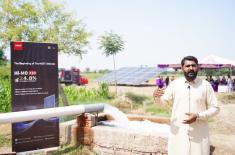
How LONGi is Transforming Agriculture in Pakistan
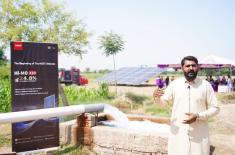
How LONGi is Transforming Agriculture in Pakistan
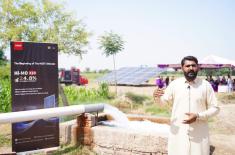
How LONGi is Transforming Agriculture in Pakistan
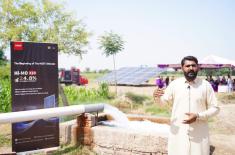
How LONGi is Transforming Agriculture in Pakistan
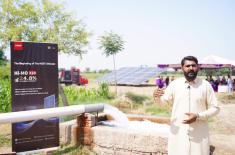
How LONGi is Transforming Agriculture in Pakistan
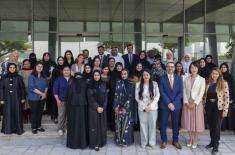
MoHAP, WHO organise training programme to enhance elderly care capacities

Abu Dhabi Customs, US Customs and Border Protection explore enhanced cooperation
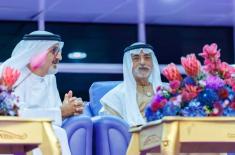
Nahyan bin Mubarak inaugurates 'Al Ain Masters 2025' badminton championship

TECNO Spark 40C Launched in Pakistan – Big Battery, Stylish Design, and Everyd ..
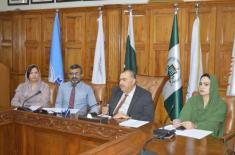
Boosting teaching and research: UHS extends faculty councils to clinical discipl ..

PCB Chairman Naqvi invites Indian Captain to Collect Asia Cup 2025 trophy

UAE leaders congratulate Governor-General of Tuvalu on Independence Day
More Stories From Business
-
Smog Monitoring & Control Committee formed in Faisalabad
11 minutes ago -
Experts discuss National AI Policy; project 7–12% GDP growth, 1mln jobs by 2030
11 minutes ago -
ICCI President, Austrian Ambassador explore avenues for stronger business ties
1 hour ago -
Gold price surges by Rs3,500 to Rs410,278 per tola
3 hours ago -
Pakistan planning investor conference in US to attract investment
3 hours ago -

KSE-100 index hits record high, crosses 166,000 points
5 hours ago
-
Pakistan repays $500 mln Eurobond, maintains steady debt servicing amid improved outlook
5 hours ago -
Bank Rates
6 hours ago -
EXCHANGE RATES FOR CURRENCY NOTES
7 hours ago -

Currency Rate In Pakistan - Dollar, Euro, Pound, Riyal Rates On 1 October 2025
9 hours ago -

Today Gold Rate in Pakistan 01 October 2025
10 hours ago -
FBR extends tax filing deadline to Oct 15
18 hours ago








